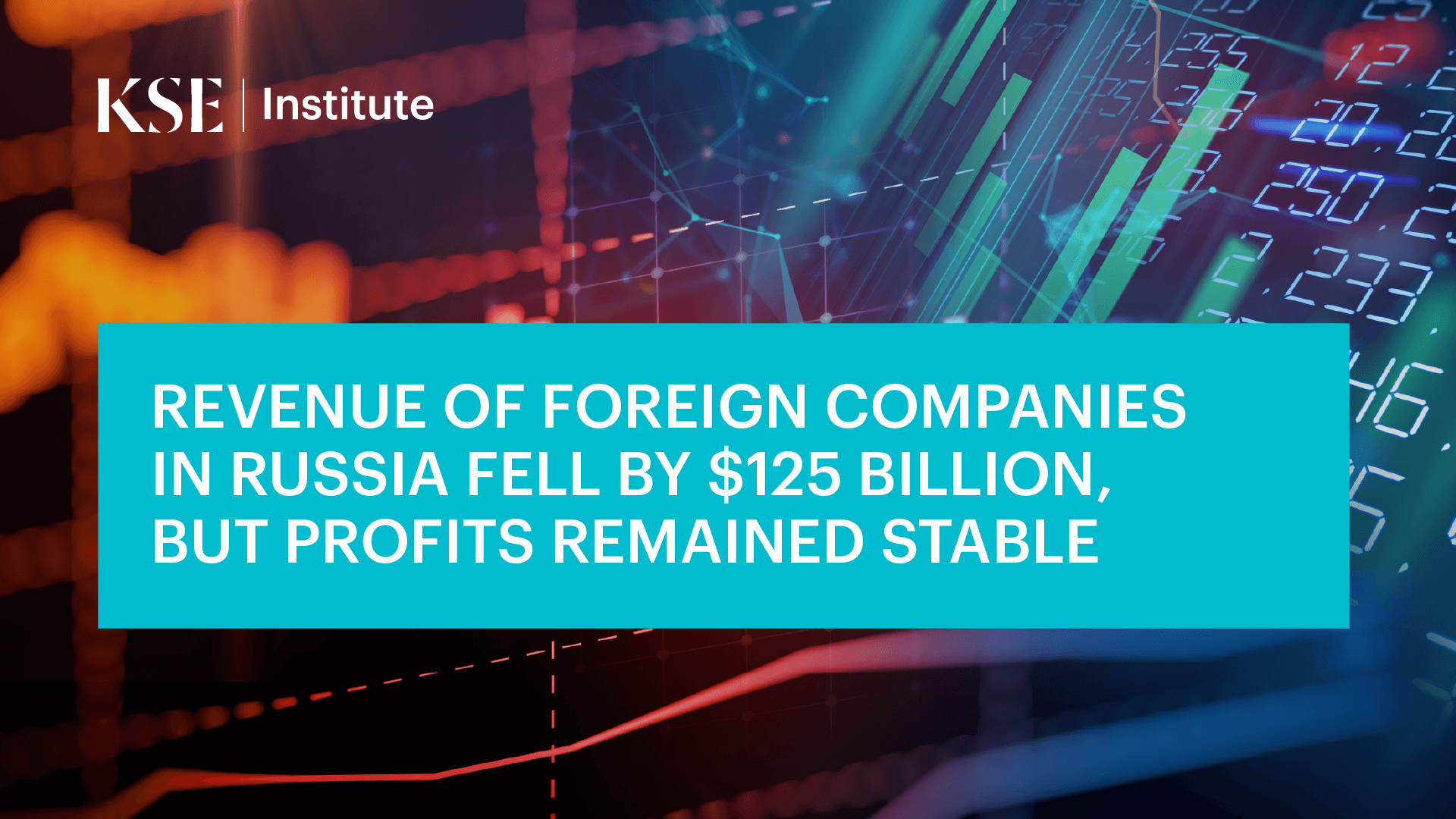- Kyiv School of Economics
- About the School
- News
- Revenue of Foreign Companies in Russia Fell by $125 Billion, but Profits Remained Stable — KSE Institute Study
Revenue of Foreign Companies in Russia Fell by $125 Billion, but Profits Remained Stable — KSE Institute Study
26 September 2024

Over the two years since the full-scale invasion, Russia has lost USD 125 billion in revenue from Western companies, equivalent to about 5.6% of the country’s GDP. These are the results of a study released by experts at KSE Institute as part of the “SelfSanctions / LeaveRussia” project in their analytical note, “What are the financial results of foreign business in Russia in 2023, and have exit rates slowed down?“.
Since the beginning of Russia’s full-scale invasion of Ukraine, the number of foreign companies with assets in Russia has decreased from 1,510 to 1,131. Many companies have sold their assets to local or foreign owners or have liquidated their operations. However, many businesses continue to operate in Russia, facing difficulties in physically exiting or choosing not to leave the market.
The total revenue of foreign companies in Russia fell from $318 billion in 2021 to $193 billion in 2023. Despite the decline in revenue, profits remained almost at the same level—$16.7 billion in 2023 compared to $18.4 billion in 2021, the year before the invasion.
At the same time, the income tax paid by foreign companies in the Russian Federation even increased from $5.4 billion in 2021 to $6.4 billion in 2023. KSE experts attribute this growth to increased tax pressure.
Companies that stayed in Russia (status stay) lost less revenue (from $138.6 billion to $131.9 billion) than those that declared or completed their exit. Their profits significantly increased—from $7.7 billion in 2021 to $11.8 billion in 2023—which may indicate gains from operating in a less competitive environment.
The largest revenue decline was observed in the Consumer Cyclical sector, dropping from $131 billion to $55.9 billion over two years. In contrast, the greatest profit increases were noted in the Financial Services and Consumer Defensive sectors.
Raiffeisen Bank stands out in the financial sector, with its profits in Russia reaching nearly $1 billion in 2023. In the consumer sector, companies like Mondelez and PepsiCo continue active operations and increase their financial indicators. Mondelez increased its revenue from $1 billion to $1.4 billion, with profits rising from $17 million to $62 million. PepsiCo maintained revenue levels above $4 billion, and profits grew from $32 million to $135 million.
Companies from the United States and Germany reduced their revenue in Russia the most, while Chinese companies increased their presence, particularly in the automotive sector. Chinese brands Haval and Chery Automobile are actively replacing Western manufacturers that have left the market, boosting their sales and profits several times over.
Some companies, such as Leroy Merlin, announce their exit from Russia but continue operations through formal asset sales. Investigations indicate that such deals may be purely technical, lacking a real disengagement from the Russian market.
Official sectoral sanctions, particularly on technology exports, also affect the activities of foreign companies in Russia. However, experts note that further business exits are possible only through strengthening such sanctions, as the potential for voluntary self-restrictions has been effectively exhausted.
Experts at KSE Institute conclude that despite the substantial reduction in revenue, many foreign companies continue to earn profits in Russia, thereby financing the budget of the aggressor country. Further exit of foreign businesses from Russia is possible only through the intensification of sectoral sanctions and increased pressure from governments and the international community.
As of September 2024, a total of 2,155 international companies continue to operate in Russia. 1,358 businesses are reducing their operations, while 423 have fully completed their exit from the country.
In the past month, six companies—American Express, Daniel Wellington, Kapsch, Momentive, Wolters Kluwer, Brookes Education Group, Flint Group, and Hugo Boss—have completed their exit through liquidation or sale of their business.
Additionally, the status of two companies has been downgraded. SPAR opened new stores in Moscow in August 2024, indicating that the company continues to operate in Russia. SOCAR’s key company, LLC “SOCAR RUS,” continues to operate as usual, and recent agreements suggest ongoing cooperation between Russia and Azerbaijan, although specific projects have not yet been announced.
Please get acquainted with the full version of the analytical note by following the link.
